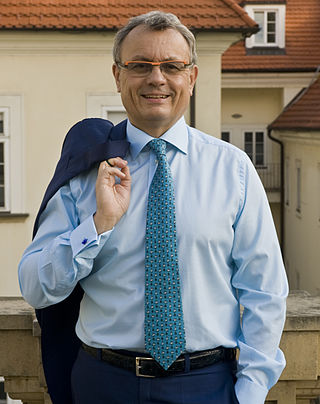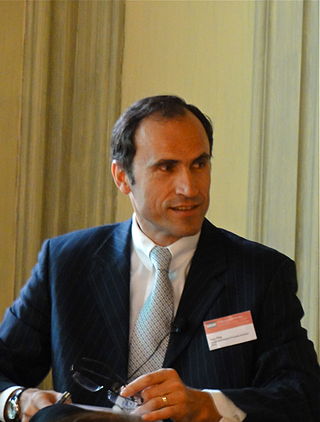
The Velvet Revolution or Gentle Revolution was a non-violent transition of power in what was then Czechoslovakia,occurring from 17 November to 28 November 1989. Popular demonstrations against the one-party government of the Communist Party of Czechoslovakia included students and older dissidents. The result was the end of 41 years of one-party rule in Czechoslovakia,and the subsequent dismantling of the command economy and conversion to a parliamentary republic.

Václav Klaus is a Czech economist and politician who served as the second president of the Czech Republic from 2003 to 2013. From July 1992 until the dissolution of Czechoslovakia in January 1993,he served as the second and last prime minister of the Czech Republic while it was a federal subject of the Czech and Slovak Federative Republic,and then as the first prime minister of the newly independent Czech Republic from 1993 to 1998.
The dissolution of Czechoslovakia took effect on December 31,1992,and was the self-determined split of the federal republic of Czechoslovakia into the independent countries of the Czech Republic and Slovakia. Both mirrored the Czech Socialist Republic and the Slovak Socialist Republic,which had been created in 1969 as the constituent states of the Czechoslovak Socialist Republic until the end of 1989.

Public Against Violence was a political movement established in Bratislava,Slovakia in November 1989. It was the Slovak counterpart of the Czech Civic Forum.

Oldřich Dědek is a Czech economist. He graduated in agricultural economics from the University of Economics,Prague.

The Czech National Bank,is the central bank and financial market supervisor in the Czech Republic,headquartered in Prague. It is and a member of the European System of Central Banks. It was established on 1 January 1993 from the division of the State Bank of Czechoslovakia as part of the process of dissolution of Czechoslovakia,together with the National Bank of Slovakia.

Josef Tošovský is a Czech economist and former governor of Czech National Bank. From 17 December 1997 to 22 July 1998 he was the prime minister of the Czech Republic in a caretaker government.
Josef Zieleniec is a Czech politician and former Member of the European Parliament. From 2004,was a member of the SNK European Democrats (SNK-ED). In the European Parliament,he was a member of the European People's Party and served on the European Parliament's Committee on Foreign Affairs and Committee on Economic and Monetary Affairs. Zieleniec is currently a lecturer at the Prague academic center of New York University.

The Prague University of Economics and Business (PUEB) is a triple crown accredited economics and business-oriented public university located in Prague,Czech Republic. It is the largest university in the field of economics,business and information technology in the Czech Republic,with 14,000 students across its bachelor,master,doctoral and MBA programs. It is considered the best business school in the Czech Republic and one of the best in Central and Eastern Europe. It is also a part of the CEMS global alliance.

Václav Benda was a Czech Roman Catholic activist and intellectual,and mathematician. Under Communist rule in Czechoslovakia,Benda and his wife were rare in being believings Christians among the leadership of the anti-communist dissident organization Charter 77. After the Velvet Revolution,Benda became the head of an organization charged with investigating the former Czechoslovakian secret police and their many informants.

Zdeněk Tůma is a Czech economist,who was the Governor of the Czech National Bank from 1 December 2000 to 30 June 2010. He had previously served as Vice Governor of the Bank from 13 February 1999 to 30 November 2000.

Vladimír Dlouhý is a Czech economist and politician.

The Faculty of International Relations (FIR) is one of six faculties at the University of Economics,Prague (VŠE),located within the main university campus in Prague,Czech Republic. The faculty specializes in teaching and research in fields related to international economic and political relations.

Ivan Pilip is a Czech politician and economist who was finance minister from June 1997 to July 1998,after having been the Minister of Education,Youth and Sport from 1994 to 1997.
Prof. Eng. Valtr Komarek,MD. was a Czech economist,forecaster and politician. A participant in the Velvet Revolution in 1989,Komárek subsequently entered politics a part of the Czech Social Democratic Party (ČSSD),leading the party into elections in 1992,and serving as honorary chairman of the party from March 2011. He also served as First Deputy Minister of National Understanding,and as an MP in the Federal Assembly. He is considered one of the key figures of the Velvet Revolution and post-revolution politics and economics.

Jan Mládek is a Czech economist and Social Democratic politician who served as Minister of Industry and Trade from 2014 to 2017. Between 2005 and 2006 Mládek also was Minister of Agriculture in Paroubek's cabinet. He also served as a member of the Chamber of Deputies.

Jozef Šesták is a Slovak diplomat,expert on international negotiations in the field of foreign policy and diplomacy. His highest position:State Secretary of the Ministry of Foreign Affairs of the Slovak Republic. His highest diplomatic rank:Ambassador.

Mojmír Hampl is a Czech economist,who has been the Chairman of the Czech Fiscal Council since 2022. Previously,from 2019 to 2021,he worked for KPMG Czech Republic as a director responsible for financial sector services. Between 2006 and 2018 he served as a board member of the Czech National Bank. From 2008 he held the post of CNB Vice-Governor. He has been also a co-founder and a board member of the Institute of Economic Education INEV in Prague.

Brazil–Czech Republic relations refers to the diplomatic relations between the Federative Republic of Brazil and the Czech Republic. Both nations enjoy friendly relations,the importance of which centers on the history of Czech migration to Brazil. Approximately 500 thousand Brazilians have Czech ancestry. Both nations are members of the United Nations.

The National Bank of Czechoslovakia was the central bank of Czechoslovakia between 1926 and 1939. Between 1939 and 1945,its activities were divided into the National Bank for Bohemia and Moravia in Prague in the Protectorate of Bohemia and Moravia and the Slovak National Bank in the Slovak Republic. The National Bank was re-established in reunified Czechoslovakia in 1945,and in 1950 renamed State Bank of Czechoslovakia.


















